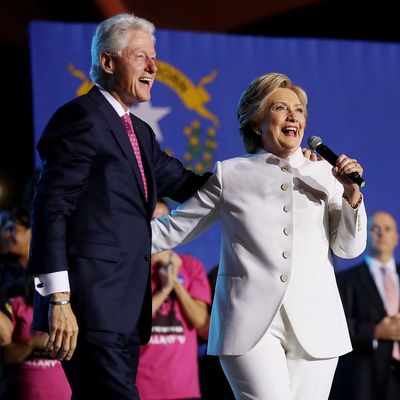
For the first time in a generation, Bill and Hillary Clinton will not be major factors in a U.S. election cycle. This year, the 2016 Democratic presidential nominee is selectively endorsing candidates. She recorded a robocall for Stacey Abrams, a candidate in tomorrow’s gubernatorial primary in Georgia. And she is expected quite soon to endorse longtime allies Governor Andrew Cuomo of New York and Senator Dianne Feinstein of California. But she will not be front and center in any campaigns, partly because her very presence continues to be a red flag for both the left and right.
Meanwhile, the 42nd president, who is said to be characteristically champing at the bit to get back out on the campaign trail, has become radioactive in the #MeToo moment. As the alleged sexual adventures of Donald Trump and Roy Moore gained attention in 2016 and 2017, renewed attention to Bill’s admitted and alleged behavior toward women popped up among liberals reconsidering the impeachment saga of the late 1990s and conservatives playing “so’s your old man.” This shocking moment from a New York Times interview last fall exemplified changing attitudes toward Bill Clinton among Democrats:
Senator Kirsten Gillibrand, Democrat of New York, who holds Hillary Clinton’s former seat, said on Thursday that Bill Clinton should have resigned the presidency after his inappropriate relationship with an intern came to light nearly 20 years ago.
Asked directly if she believed Mr. Clinton should have stepped down at the time, Ms. Gillibrand took a long pause and said, “Yes, I think that is the appropriate response.”
If this antipathy is common among Democrats in the Clintons’ adopted state, the couple is basically invisible in the state that elected Bill to statewide office five times and where Hillary Clinton served as First Lady for 12 high-profile years. As the Times reports:
In Little Rock, Ark., where on Tuesday there is a Democratic primary election for a Republican-held House seat the party covets, none of the four candidates running has reached out to seek the Clintons’ support, their campaigns said.
And that’s typical of the attitude of many red-state Democrats from the moderate wing of the party once closely associated with the Clintons:
At least two Democratic women have nearly begged Mrs. Clinton to stay away from their high-stakes red-state Senate races. After Mrs. Clinton said in March that she won parts of America that are “moving forward,” unlike Trump-friendly areas, Senator Claire McCaskill of Missouri rebuked her.
“I don’t think that’s the way you should talk about any voter, especially ones in my state,” Ms. McCaskill said.
Senator Heidi Heitkamp of North Dakota was blunter when asked, on the radio, when Mrs. Clinton might “ride off into the sunset.”
“Not soon enough,” she replied.
It could be different for Hillary Clinton in friendlier parts of the country later this year, when a polarized general-election climate will likely make Democratic recriminations about her 2016 campaign fade, while making renewed Republican cries of “Lock Her Up” look both redundant and petty.
She introduced a political group, Onward Together, after the 2016 election, and has directed millions to liberal grass-roots organizations, like Indivisible and Swing Left. And she is in talks about campaigning for some Democratic candidates in the fall, likely in a cluster of House districts where she defeated Mr. Trump.
Still, for Democrats who grew up in a political era largely defined, for good or for ill, by Bill and Hill, the eclipse of Washington’s ultimate power couple will seem strange. It now seems likely that the 42nd president’s big moment in 2018 will be the publication next month of a thriller novel he co-wrote with best-selling author James Patterson. And Hillary Clinton will struggle to overcome the constant association with what might have been.






























